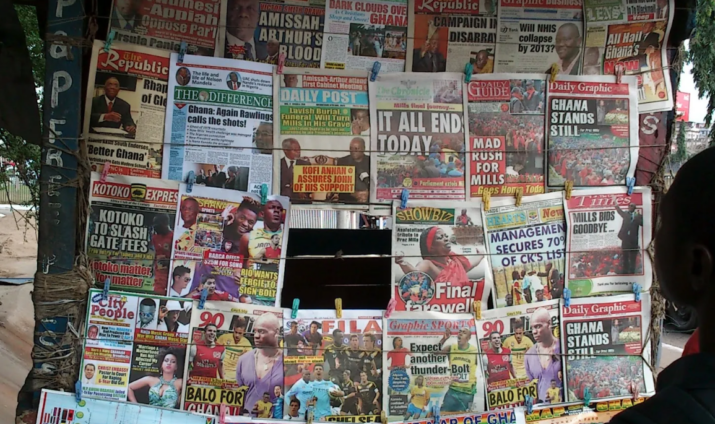Dr Wilberforce Sefakor Dzisah, a former Rector of the Ghana Institute of Journalism (now UNIMAC-GIJ), has urged media practitioners not to give prominence to political actors whose utterances are likely to disturb the peace and security of the country.
He said that was the only way the country could emerge from the December 7 presidential and parliamentary elections united and unscarred.
Speaking at a two-day training organised by the United Nations Educational, Scientific and Cultural Organisation (UNESCO) for selected journalists in the Greater Accra Region, Dr Dzisah warned the media against being used as conduit to propagate hatred against any individual or group.
“We must ensure that those we speak to, those we bring to our studios to communicate for the various political parties do not unnecessarily incite hatred, intolerance, particularly religious intolerance and also issues of gender violence,” Dr Dzisah stressed.
The objectives of the training were to sensitise journalists on international standards regarding human rights, freedom of expression, freedom of the press, and elections, build their capacities on how the new digital era, including the internet, social networks, Artificial Intelligence (AI), Big Data, and Machine Learning, impacted electoral processes and enhance their capacity to effectively cover the 2024 elections.
Also, it was to build their capacities on gender-sensitive media coverage during elections as well as enable them to address online harmful content while securing freedom of expression and access to information.
It was on the theme: “Elections in Digital Age: Countering Hate Speech and Misinformation on Social Media Platforms for Peaceful Electioms”.
Dr Dzisah said journalists and the media at large, had crucial role to play in sustaining the country’s peace and democracy.
He said they must, therefore, act professionally in the discharge of their duties, cautioning them against allowing themselves to be used as a tool to stoke political, religious and tribal tensions.
“We must also eschew issues of ethnocentrism, tribalism and also religious intolerance,” he emphasised.
Dr Dzisah also stressed on the relevance of an impartial, accurate, and objective coverage of the 2024 elections, reminding journalists of the importance of prioritising the national interest over every other interest.
“We should first and foremost show professionalism, we should be objective and balanced in our reports, we should check our facts and we should also ensure that we do not fall for disinformation, misinformation and mal-information and it is important that truth will stand in our engagements,”he said.
Dr Dzisah who is currently the Head of Department, Liberal Arts and Communications Studies, Ghana Institute of Management and Public Administration (GIMPA), urged Ghanaians to be mindful of their utterances, especially in the run-up to the 2024 elections, stressing that even though they were at liberty to express opinions on matters of national interest, such must be done within the confines of the laws of the country.
“To every law, there is an exception,” he said, adding that “Article 164 of our 1992 Constitution specifies that we cannot disseminate information that could lead to disorder or affect public morality in terms of national security.”
Mr Edmond Moukala, Representative and Head of Office, UNESCO Accra office, stressed the need for media practitioners to be professional in their reportage, indicating that, that was key to maintaining the peace in the country before, during and after the polls.
“Let me stress that the values of journalism—truth, fairness, and integrity—are more important than ever,” he emphasised.
Mr Moukala also noted that the Journalism landscape had, over the past few years, evolved rapidly due to digital technology advancement, explaining that social media platforms had bolstered the speed of news reporting.
However, he said, that must not stop journalists from pursuing accountability, balanced, and fact-checked reportage.
“Let us be guided that the spread of false and misleading information still possess a challenge, therefore, we encourage you as journalist to verify information precisely and swiftly before disseminating,” he stressed.
Dr Aurelia Ayisi, Lecturer, Department of Communications Studies, University of Ghana, encouraged self censorship to ensure right information was disseminated to the public.
Latest Stories
-
Top 20 Ghanaian songs released in 2024
50 seconds -
Beating Messi’s Inter Miami to MLS Cup feels amazing – Joseph Paintsil
15 minutes -
NDC administration will reverse all ‘last-minute’ gov’t employee promotions – Asiedu Nketiah
26 minutes -
Kudus sights ‘authority and kingship’ for elephant stool celebration
27 minutes -
We’ll embrace cutting-edge technologies to address emerging healthcare needs – Prof. Antwi-Kusi
60 minutes -
Nana Aba Anamoah, Cwesi Oteng to attend Philip Nai and Friends’ charity event
1 hour -
Environmental protection officers receive training on how to tackle climate change
1 hour -
CLOGSAG vows to resist partisan appointments in Civil, Local Government Service
2 hours -
Peasant Farmers Association welcomes Mahama’s move to rename Agric Ministry
2 hours -
NDC grateful to chiefs, people of Bono Region -Asiedu Nketia
2 hours -
Ban on smoking in public: FDA engages food service establishments on compliance
2 hours -
Mahama’s administration to consider opening Ghana’s Mission in Budapest
2 hours -
GEPA commits to building robust systems that empower MSMEs
2 hours -
Twifo Atti-Morkwa poultry farmers in distress due to high cost of feed
2 hours -
Central Region PURC assures residents of constant water, power supply during yuletide
3 hours

